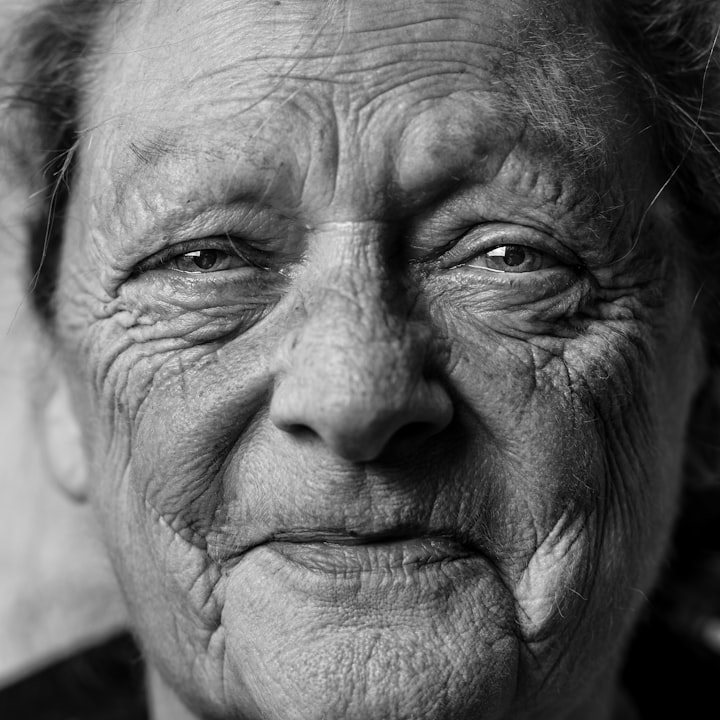An Insignificant Rebellion
or: Hobbily Ever After

He steps in after her and closes the door behind them. She crosses to the window, the only one in the concrete room that they both now call home, and turns to look at him. Her life before this moment had consisted solely of her mother, her siblings, her cycle of fathers. Now it’s time for her to leave that behind.
He glances at his watch. He’s fidgety. She doesn’t like that.
“My shift is in half an hour,” he mumbles. He looks up at her again, reluctant, and she remembers her mother’s warning to remain detached. She thinks it won’t be difficult.
“Let’s get to it, then,” she says, and begins to remove her coat.
---
He waits, along with the other workers of his shift, at the forbidding gates leading from the outer ring of the city into the agricultural ring beyond. Most workers stand perfectly still, silently begging to be left alone; this is not a place for camaraderie. When the alarm screeches to life, the gate swings open, and they begin filing through.
He shuffles behind an older man—must be nearing retirement, this one, the way he hobbles—and ducks his head as he steps through the arched scanner. The machine beeps as it scans his chip, and he pushes through a barrier that can be acutely felt but not seen, from the cool, gray city out into the patchwork fields that stretch into the distance under the hard-bearing sun and bleached-white sky.
He turns and looks into the city through the barrier. It’s fascinating, the way the city seems to float through an invisible sea of honey, the dream-like grace that everything is afforded through the slowing of time.
He thinks of her, new and soft, distant and frightening, sitting in their new home. For her, only minutes will pass before the next alarm sounds; for him, it will be thirty days.
He lingers too long. The chip in his neck emits a warning shock, jolting him into obedience.
His designated field is near the outer perimeter of the agricultural ring.
He has a long way to walk.
---
She leans over him as he snores, peering into his sunburnt face. He spends most of his free time recovering from bone-deep exhaustion. It’s only been a week since they were matched, so the time-dilated age gap between them is not yet noticeable. One day, not long from now, he will be old, but she will still be young; he will retire, and she will move on to her next partner.
Suddenly irritated, she jabs him in the shoulder. He wakes with a start, looking bewildered.
“Dinner,” she says shortly, before turning away.
---
When he emerges from his usual drawn-out, steaming shower, he crawls into bed beside her. She feels the exhaustion radiating from him as he settles in.
“Tell me about what it’s like out there,” she says softly. He stills; they’ve never spoken like this before.
He clears his throat. “It’s hot,” he mumbles. “Windy. Dry.”
“You plant things, right? What do you plant?”
“Oh,” he says, “this, that. Corn, mostly.”
She rolls over to face him. “How do you grow corn?”
He stares at the ceiling, jaw working. “Well, first you have to clear out the trash.”
“Trash?”
“From the old outer ring. Lots of debris left from those days.”
“And you need water, right? Where does it come from?”
“There’s no rain, so we channel it from the forest.”
The forest. She’s heard of it before—colossal trees that stretch out for miles, with mottled bark, far-reaching branches, canopies of papery leaves. No trees exist here in the city. She will likely never see one in her life.
“Tell me about the forest,” she says.
He glances at her uneasily. “Tall,” he says, subconsciously lowering his voice. “Taller even than the city walls. You can see where the time starts to go faster. The trees move like they’re in a storm.”
“Do you see sunsets?” She asks.
“Yes,” he says thoughtfully. “There’s a mountain past the trees. Catches the sun as it sets.”
“All the colors. Do they really…?”
“Yes.”
She hums. “I’d like to see that someday.”
She can feel him looking at her as she closes her eyes.
---
Her period is weeks late. He accompanies her to the birthing department, and the doctor, a beige-toned little man who blends in almost perfectly with the walls, confirms what she already knows.
As they walk home, she glimpses their reflection in the glass of a building. She almost doesn’t recognize herself—the colorless, one-size-fits-all smock and the pinched expression look like someone she doesn’t want to be.
She glances at him in the reflection. Their eyes connect, second-hand, light bouncing off glass. He looks away.
---
He comes home one day with a poorly-hidden smile, and something about his expression makes her realize that the signs of aging are beginning to show in his face.
“I have something for you,” he says.
She perks up, and he fishes a silver heart-shaped locket on a chain from his pocket. He places it in her palm, and she rubs her thumb over its puckered, heavily-oxidized surface, where time has left its indelible mark.
She tries to pry it open.
“I tried that too,” he says as he ambles toward the bathroom. “Hinge is probably rusted shut.”
He closes the bathroom door and turns the water on. She rolls the locket over in her palm with care, relishing the unexpected beauty of it. It isn’t explicitly forbidden to bring in objects from beyond the city, but many rules are not explicit. He could have gotten into trouble.
“Thank you,” she whispers.
That night, she waits for his breathing to even out before searching out his hand. She holds it, feels sick and elated, guilty and liberated.
---
Her body begins to swell, organs shifting, back and ankles straining. She wakes every morning with increasing frustration and discomfort.
But he hardly seems to notice. As he slides into bed with her every night, he places his palm protectively on her belly. They’ve progressed from holding hands to holding each other, and in those silent pockets of lost time, she feels beautiful.
---
“Do you believe what they say about the inner ring?”
“No.” He’s used to her abrupt questions now.
“The gold-paved streets, colorful clothes? Time slow as honey?”
“No.”
“What do you think happens when we’re retired?”
“We go to the inner ring.” He finishes lacing his boots and stands up, looking at her solemnly. “We die.”
---
Cresting waves of pain, inescapable. He squeezes her hand, looking as frightened as she feels.
“Breathe,” he says, because that’s the only thing he can think of to say. “Breathe.”
---
The child is deathly silent. For a moment, she fears the worst. But then the child opens its mouth and cries with all its meager strength—forlorn, bleating protests at being brought into this world.
“A girl,” the midwife proclaims; she cleans the infant, wraps her in cloth, places her in her father’s arms, and leaves the room.
She stares at her still-bawling daughter, exhausted, unable to look into his face. When she finally musters the courage, she finds a curious expression there, a hole where the fatherly love or unpolluted happiness or whatever emotion she might’ve expected should have been.
He places their daughter at her breast and leaves.
---
Life is irrevocably different. Every moment is devoured by their daughter. It’s distressing, at first, this total invasion, this upending of their tenuous normality. But she realizes one day as he’s leaving for his shift, and as she’s noticing his increasingly bow-legged gait, the flecks of gray in his dark hair, the unmistakable wrinkles bracketing his mouth, that their daughter is a distraction from his impending retirement.
So she throws herself entirely into parenthood. She tries to stop noticing.
---
Their remaining time marches on relentlessly. He nears fifty, and his imminent retirement becomes something she can no longer ignore.
She knows he feels it too. He refuses to hold or even look at their daughter. Their bed is a place of distance rather than intimacy, if it even was intimacy.
She imagines herself in the future, with children surrounding her, a swarm of upturned faces. She imagines herself dutifully cycling through partners. She imagines facing this tangle of emotions with every arrival, every departure. She imagines feeling nothing at all.
---
His penultimate shift. He leaves as though nothing is different.
She wraps her daughter in their one blanket, and pulls on every article of clothing she owns, every undyed scrap, even her winter cloak. Holding her daughter close, she slips out and ventures to the city gate.
She’s never been here before, never had any reason to be. She stays well within the shadows and watches as workers mill about, waiting.
He’s out here as well. She scans the crowd for him, anxious to avoid his notice. She doesn’t see him.
The alarm sounds and the gate swings open with a deep groan. The workers fall in line, and she inserts herself near the end, keeping her head down, her daughter close. The child gurgles, senses her anxiety, looks at her with wide-eyed solemnity, so very like him. The workers around her give her furtive, curious looks, but no one asks.
The line moves along quickly, and she finds herself facing the electronic arch.
Clutching her daughter, she stumbles her way through—
Nothing. No alarm, no electric shock. Has no one ever tried to leave before? Does the city not care?
Not stopping to wonder, she steps through the invisible barrier, bracing for the stomach-turning sensation that he often described, and breaks into a run.
He’d described his field to her in detail. She knows how to find it, and consequently how to avoid it. She heads in the opposite direction, her daughter bouncing awkwardly against her breast. Soon, her side is cramping, calves burning, but she pushes on, terrified still that someone will stop her.
She sees the trees in the distance, like monoliths erected by some alien empire. He was right; through the invisible barrier, the faster flow of time is evident in the frantic swaying of branches, the small creatures flitting about in the dappled sunlight.
She looks over her shoulder, one last time. Some have returned to their tasks; others stare at her from a safe distance, curious, empty.
She turns and disappears into the trees.
---
Upon returning, he notices at once that the apartment is empty. He stands there, puzzled.
Perhaps they’ve gone to the entertainment sector. He’ll wait here, take a nap. He showers and clambers into bed, muscles aching.
He wakes in the morning, hungry and groggy and late, and the apartment is still empty.
He rushes to the city gate, hardly able to process that this is the last time he’ll walk out into the agricultural ring. This isn’t how he wanted to spend his last day. This isn’t how he wanted to part with them, with her.
The alarm wails, the gate swings open. He falls in line, his mind racing.
---
As he approaches his field, he looks up and sees two figures, one tall, one stooped. He draws nearer, slowly—it’s possible his eyes are playing tricks on him, they’ve been doing that lately—and sees that their clothes are ragged, skin browned and pockmarked, hair colorless and tangled.
The taller woman—young, thin, unfamiliar—draws away, distrustful. The shorter one peers at him with unreadable eyes, bright chips in the leathery skin of her face. Despite her apparent age, her wasted body, her posture is strong.
He glances down and notices the locket around the older woman’s neck. He recognizes slowly, comprehends slowly.
The younger woman turns to the trees. The older woman looks at him intently, before turning away as well.
He follows them into the forest.
About the Creator
GT Caruthers
Twitter: @gtcaruthers






Comments
There are no comments for this story
Be the first to respond and start the conversation.